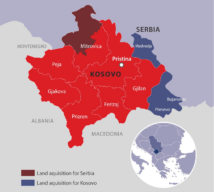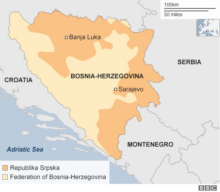On the surface, the EU enlargement to the Balkans finds everyone in agreement: European partners and governments of the candidate countries. In reality, the failure of the last summit between Serbia and Kosovo shows that it is not just a matter of overcoming some residual ‘technical’ obstacles: there are problems with deep roots, which correspond to some uncomfortable truths that we tend to overlook.
First problem. The current domestic political situation in Serbia is degraded, with President Vucic and his government contested by an opposition divided between ultranationalists and pro-Europeans. More serious, the majority of voters now seem to be against the prospect of joining the Union; on the other hand, the Russian chimeras are always present in Belgrade on the road to Brussels.

Second problem. The normalisation of relations between Serbia and Kosovo is bogged down, with latent “karst” tensions, repeated acute episodes and with increasing risks of open conflict. Pristina refuses to create the planned Association/Community of Serbian Municipalities with a predominantly Serbian-speaking majority, arguing that autonomy would be the antechamber to secession.

Third problem. After almost thirty years, the Dayton Accords have failed to “build” a pacified Bosnia-Herzegovina, which, on the contrary, appears today as a mere fiction of a state. The Republika Srpska, one of its two autonomous components, shows open impatience with the current institutional set-up, with a clear secessionist vocation. On the other hand, the country as a whole is increasingly weakened by an endemic economic crisis, with a serious impoverishment due to massive emigration at all levels.
It seems natural then to ask whether these three problems – and many others intrinsically linked to them – are unsolvable. The answer must be no, but there must be a full realisation that solving them requires more than a substantial transfer of resources, as the EU has done so far.
The EU itself, for its part, must also overcome difficult problems. First of all, it cannot afford to take on new members characterised by internal political turmoil and serious, as yet unresolved conflicts: it would jeopardise its own cohesion. But in any case, experience shows the absolute need for a radical overhaul of its decision-making mechanisms, in the sense of overcoming the current system that allows each Member to exercise a right of veto. This latter objective represents an indispensable requirement in respect of which a review process has already been launched, but with still uncertain prospects. The desired solution is a precondition for completing the integration of the Balkans into the EU, also with Ukraine and other candidates in mind.
But this is not enough. It also seems necessary to find a new approach to resolving the conflict between Serbia and Kosovo and that between Republika Srpska and the other components of Bosnia-Herzegovina. For this, a negotiation should be promoted in which the pragmatism of reason prevails over the sterile opposition between two pillars of international law, which today are antithetical: that of the intangibility of borders and that of the self-determination of populations.
In concrete terms, it would be a matter of setting up a decisive solution, with the northern province of Kosovo and the Republika Srpska joining Serbia (with some appropriate an necessary territorial adjustments), and the union of the Albanian-speaking Preshevo Valley communes to Kosovo. Such process assisted by a revolving fund for compensation, at market prices, for citizens and economic activities that wished to move to one side or the other of the new borders: without counting the human tragedies, the final cost would in any case be lower than those of a possible new Balkan war.
Moreover, having a convincing initiative by Brussels in this direction, makes it possible to weaken the ambitions that are increasingly manifest in the region: namely of Russia, China and Turkey. And in the meantime, the Balkan governments should be able to strengthen their ties with Brussels by joining the prospective European Political Community, in respect of which France has taken an initiative already shared by Germany and other partners.
Giorgio Rosso Cicogna
Former Alternate Secretary General of the Central European Initiative






















